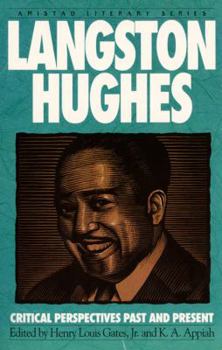Langston Hughes: Critical Perspectives Past and Present
James Langston Hughes With a career that spanned the Harlem Renaissance of the twenties and Black Arts movement of the sixties, Langston Hughes was the most prolific Black poet of his era. Between 1926, when he published his pioneering The Weary Blues, to 1967, the year of his death, when he published The Panther and the Lash, Hughes would write sixteen books of poems, two novels, seven collections of short stories, two autobiographies,...
(1902 -- 1967)
Format:Paperback
Language:English
ISBN:1567430295
ISBN13:9781567430295
Release Date:February 2000
Publisher:Harper Perennial
Length:272 Pages
Weight:0.90 lbs.
Dimensions:0.8" x 6.0" x 9.0"
Customer Reviews
1 rating
Indepth Study of Genius!!
Published by Thriftbooks.com User , 18 years ago
LANGSTON HUGHES: CRITICAL PERSPECTIVES PAST AND PRESENT by Henry Louis Gates, Jr. and al, is part of the Amistad Literary Series on African Americans authors of noted literary fame and skill. As the title suggest, this particular installment discusses the some of the work of Langston Hughes. The book is divided into to sections, excluding the introduction. The first section cover contemporary reviews giving during Hughes' lifetime. As the introduction notes, the reviews are "drawn from magazines, journals, and newspapers from the mainstream and African American press." Noted reviewers include the main rival of Hughes during the heyday of the Harlem Renaissance, Countee Cullen, and one of the Renaissance's midwives, Jessie Fauset, both reviewing the WEARY BLUES. Cullen criticizes Hughes on being to much a Negro poet instead of just a poet in the Euro-centric sense and its attending influences. Cullen does offer Hughes praise here and there, but for the most part his taste contrasts sharply with Hughes resolutely Afro-centric/racial pride that would form the basis of a lifetime of the bulk of work composed by Hughes despite his being well read in the works of European authors in additon to those of African decent. Reviews of Hughes work to follow are by Sterling Brown, Richard Wright, J. Saunders Redding, Carl Van Vechten, and other lesser known figures lost to history. Sherwood Anderson reviews THE WAYS OF WHITE FOLKS where he feels Hughes may have been a little to harsh in his depiction of white folks. Considering the all to often negative depiction of black folks in the various arts of the day, at lease Hughes put a more human face on white folks, an act seldom accorded to black folks in literature by whites of that same time frame. James Baldwin provides the most caustic review of Hughes by way of Hughes SELECTED POEMS. The review hurt and angered Hughes to the point that Hughes never really liked Baldwin to much again. Later in Baldwin's life, he confessed his regret over his review and attested to Hughes' genius. The second half of the book covers essays written by scholars on Hughes' varied pieces of work. The essays are comprehensive and well written to the point that a simple review cannot do them justice. Instead, one must simply take the time to read each one or each one of interest to him or her. There are ten essays in all of varying length. For me, three interesting ones were those by Arnold Rampersad, Steven Tracy, Raymond Smith, and Maryemma Graham. Rampersad cites FINE CLOTHES TO THE JEW as representing Hughes at his very best and one never really equaled again by him. Steven Tracy covers the blues influence on the work of Hughes in-depth. Raymond Smith looks at aspects of the life of Hughes in relation to his work. Of note is the fact that Langston Hughes has more in common with blacks of the post integration period and its realities because of the "somewhat" integrated high school he attended as a teenager




